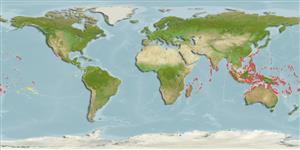分類 / Names
俗名 | 同種異名 | Catalog of Fishes(屬, 種) | ITIS | CoL | WoRMS | Cloffa
Teleostei >
Ovalentaria/misc (Various families in series Ovalentaria)
鱸形目 (Various families in series Ovalentaria) >
Pomacentridae (Damselfishes)
雀鯛科 (Damselfishes) > Pomacentrinae
Etymology: Chrysiptera: Greek, chrysos = golden + Greek, pteron = fin, wing (Ref. 45335).
Eponymy: Sir Robert Brownrigg (1759–1833) was an army officer and colonial administrator. [...] (Ref. 128868), visit book page.
Environment: milieu / climate zone / depth range / distribution range
生態學
海洋 礁區魚類; 非遷移的; 深度上下限 0 - 12 m (Ref. 9710). 熱帶; 32°N - 30°S
Indo-Pacific: East Africa to Marquesan and Society islands, north to Japan, south to Australia.
印度-太平洋: 東非到馬貴斯群島與社會群島,北至日本, 南至澳洲。
大小 / 重量 / 年齡
Maturity: Lm ? range ? - ? cm
Max length : 8.0 cm TL 雄魚/尚未辨別雌雄; (Ref. 9710)
背棘 (總數) : 13; 背的軟條 (總數) : 12 - 13; 臀棘: 2; 臀鰭軟條: 11 - 13. This species occurs in 2 basic color phases: a blue-backed (leucopoma) phase and a gray to black (amabilis) phase usually with 2 light bars (Ref. 37816). Large blue-edged black spot at end of dorsal fin base, and yellow form with black spots at end of dorsal fin and its base (Ref. 48636). Body depth 2.3-2.5 in SL (Ref. 90102).
這種出現於 2個基本的色相中: 背部藍色的 ( leucopoma) 階段與灰色的到黑色的 ( amabilis) 階段通常有 2個淺色的橫帶。 (參考文獻 37816) 在背鰭末端基底的大邊緣藍色的黑色斑點, 與黃色的形式在背鰭末端與它的基底有黑色的斑點.(參考文獻 48636)
Adults occur in rubble-strewn surge channels, the outermost reaches of exposed reef flats, and the upper submarine terrace at 12 meters. Territorial but they generally occur in groups, and remains close to shelter. Feed mainly on benthic algae and small crustaceans (Ref. 1602, 37816 ). Oviparous, distinct pairing during breeding (Ref. 205). Eggs are demersal and adhere to the substrate (Ref. 205). Males guard and aerate the eggs (Ref. 205). Diurnal species (Ref. 54980; 113699).
在 12 公尺出現於碎石-鋪蓋的洶湧峽道,裸露礁石平臺的最外範圍 , 與海底上游臺地。 具有領域性但是通常成群生活, 而且逗留在接近庇護所。 主要吃底部的藻類與小型甲殼動物.(參考文獻 1602,37816)
Life cycle and mating behavior
成熟度 | 繁殖 | 產卵場 | 卵 | 孕卵數 | 仔魚
Oviparous, distinct pairing during breeding (Ref. 205). Eggs are demersal and adhere to the substrate (Ref. 205). Males guard and aerate the eggs (Ref. 205).印度-太平洋: 東非到馬貴斯群島與社會群島,北至日本, 南至澳洲。
Allen, G.R., 1991. Damselfishes of the world. Mergus Publishers, Melle, Germany. 271 p. (Ref. 7247)
IUCN 瀕危狀態 (Ref. 130435: Version 2024-1)
無危 (LC) ; Date assessed: 01 August 2021
人類使用
漁業: 低經濟; 水族館: 商業性
工具
特別的報告
下載 XML
網路資源
Estimates based on models
Preferred temperature (Ref.
123201): 25.4 - 29.3, mean 28.4 °C (based on 2701 cells).
Phylogenetic diversity index (Ref.
82804): PD
50 = 0.5000 [Uniqueness, from 0.5 = low to 2.0 = high].
Bayesian length-weight: a=0.01479 (0.00651 - 0.03363), b=3.00 (2.81 - 3.19), in cm total length, based on LWR estimates for this (Sub)family-body shape (Ref.
93245).
營養階層 (Ref.
69278): 2.7 ±0.3 se; based on diet studies.
回復力 (Ref.
120179): 高度, 族群倍增時間少於 15個月 (Preliminary K or Fecundity.).
Fishing Vulnerability (Ref.
59153): Low vulnerability (10 of 100).
Nutrients (Ref.
124155): Calcium = 152 [84, 266] mg/100g; Iron = 0.934 [0.573, 1.490] mg/100g; Protein = 18.6 [17.5, 19.6] %; Omega3 = 0.143 [0.086, 0.231] g/100g; Selenium = 19.1 [10.8, 35.1] μg/100g; VitaminA = 142 [48, 433] μg/100g; Zinc = 2.41 [1.65, 3.39] mg/100g (wet weight);
